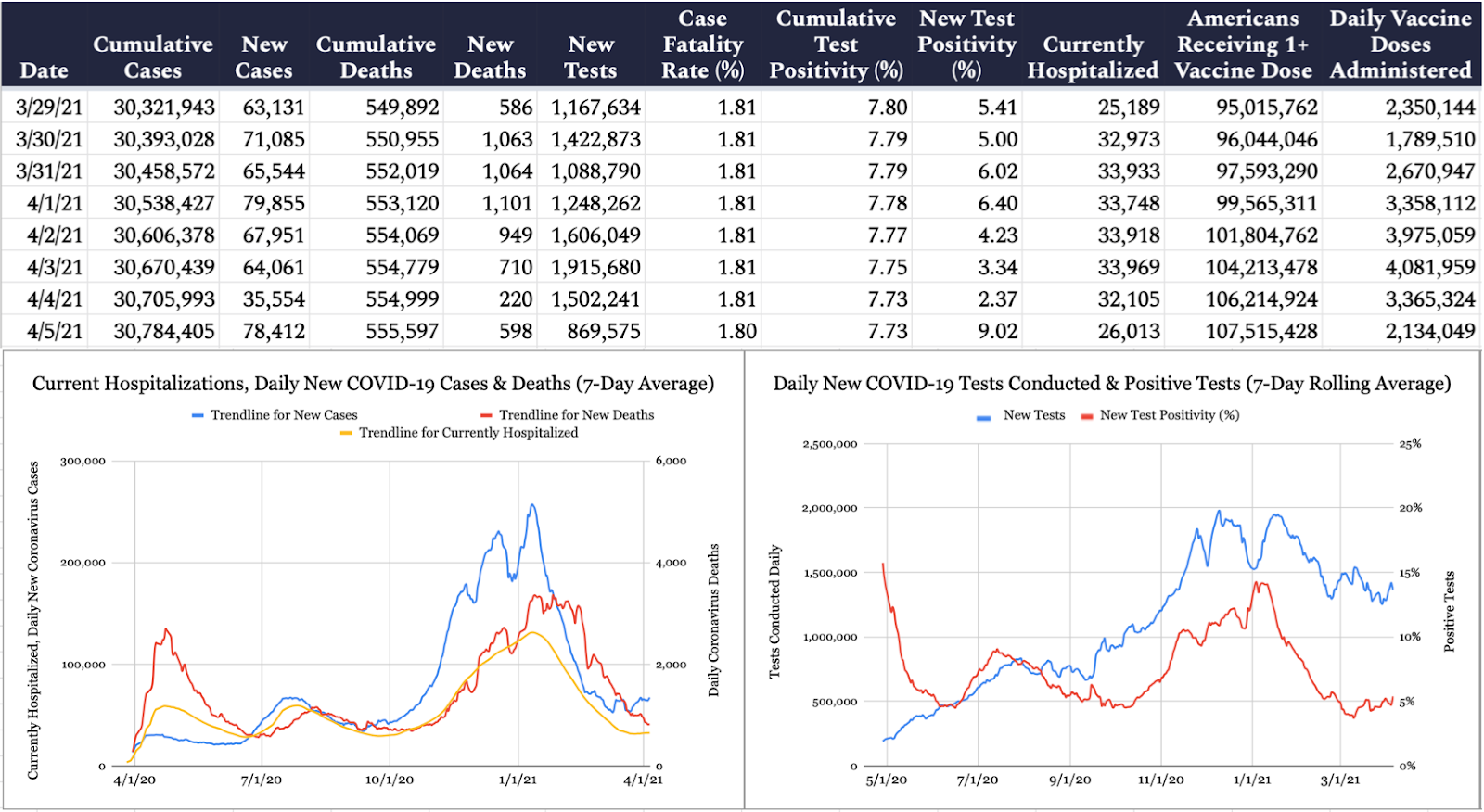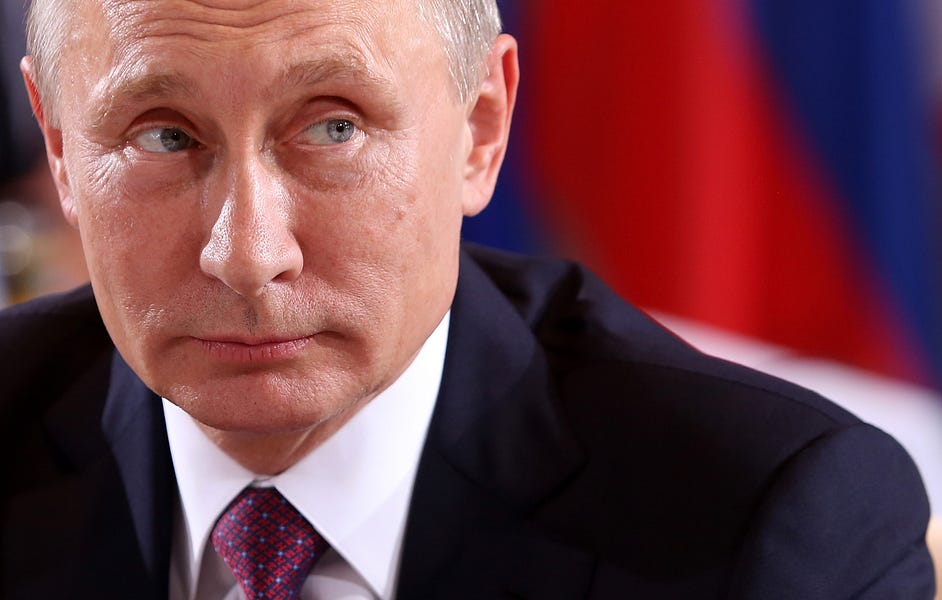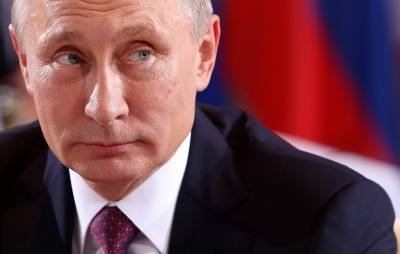Happy Tuesday! And a huge congratulations to “Entry Pass” and “BearsWant2EatYou” for coming in first and second, respectively, in the inaugural Morning Dispatch March Madness bracket pool.
We’ll have more information on how you—and the rest of the top-50 finishers—can claim your merch in tomorrow’s TMD. Thank you to everyone who participated!
Quick Hits: Today’s Top Stories
In the first major speech in her new post, Treasury Secretary Janet Yellen made the case on Monday for a global minimum corporate tax rate, a proposal intended to boost funding for President Joe Biden’s $2 trillion infrastructure plan.
The Senate parliamentarian has ruled that Democrats can use the budget reconciliation process to pass another major bill this year with only 50 votes, according to a spokesperson for Senate Majority Leader Chuck Schumer.
The Supreme Court sided with Google on Monday in the company’s $8 billion copyright dispute with Oracle over its operating system and computer code.
China has become the first country to begin issuing a digital currency—a digital yuan—to be regulated by Beijing’s central bank.
Russian President Vladimir Putin signed a law on Monday that would allow him to serve two additional six-year terms, which would permit him to stay in power until 2036.
Alexei Navalny, a leading Russian opposition figure and outspoken Putin critic, was moved to a prison hospital with a severe respiratory infection and high temperature. Navalny, who survived an assassination attempt attributed to the Russian government, is was jailed in February on what were widely criticized as trumped-up charges.
The United States confirmed 78,412 new cases of COVID-19 yesterday per the Johns Hopkins University COVID-19 Dashboard, with 9 percent of the 869,575 tests reported coming back positive. An additional 598 deaths were attributed to the virus on Monday, bringing the pandemic’s American death toll to 555,597. According to the Centers for Disease Control, 26,013 Americans are currently hospitalized with COVID-19. Meanwhile, 2,134,049 COVID-19 vaccine doses were administered yesterday, with 107,515,428 Americans having now received at least one dose.

Putin Tests the West
When Russian forces moved into Ukraine’s Crimean Peninsula in early 2014, Ukrainians watched with a sense of disbelief as Kyiv’s global allies turned a blind eye to the mostly bloodless but blatantly unlawful takeover. “There was an expectation that at any moment the international community would step in and take some sort of dramatic action—they never did,” Peter Dickinson, editor of the Atlantic Council’s UkraineAlert, told The Dispatch.
As Russian troops and armaments have mobilized to the Ukraine border at alarming rates once again over the last few weeks, the U.S. and other NATO member states may find themselves the unwitting participants in a redemption story. But invasion isn’t a foregone conclusion. Is Putin’s military build-up hollow posturing to score a geopolitical bargaining chip, or an existential threat to Ukraine’s sovereignty? If the latter, will the international community follow through on its repeated assurances of “unwavering support” for Russia’s neighbor to the West?
“At the highest levels of government, literally, across multiple institutions, we have sent that message very clearly to our Ukrainian counterparts, and implicitly to the Russians as well, that we stand by Kyiv, we stand by our partner, Ukraine, in the face of this intimidation and aggression,” State Department spokesperson Ned Price told reporters Monday. He was referring to a series of calls between high-ranking officials in President Joe Biden’s administration and their counterparts in Kyiv.
Army Gen. Mark Miller, chairman of the Joint Chiefs of Staff, reportedly spoke to Russia’s top officer—Chief of the General Staff Gen. Valery Gerasimov—and Ukrainian Chief of General Staff Lt. Gen. Ruslan Khomchak last week. Defense Secretary Lloyd Austin, national security adviser Jake Sullivan, and Secretary of State Anthony Blinken all spoke to their counterparts as well.
President Biden himself reached out to Ukrainian President Volodymyr Zelensky for the first time Friday, affirming “the United States’ unwavering support for Ukraine’s sovereignty and territorial integrity in the face of Russia’s ongoing aggression in the Donbas and Crimea.”
The U.S.’s defensive partners at NATO have also, at least rhetorically, asserted their unconditional support for Ukraine’s sovereignty. “Allies shared their concerns about Russia’s recent large scale military activities in and around Ukraine” at a meeting last Thursday, a NATO official told The Dispatch. “NATO continues to support Ukraine’s sovereignty and territorial integrity. We remain vigilant and continue to monitor the situation closely.”
European foreign policy chief Josep Borrell, who famously took a tongue-lashing from Russian officials during a trip to Moscow in February, also offered “unwavering EU support for Ukraine’s sovereignty” and doubled down on European opposition to the Crimea annexation.
In addition to concerns over the massing forces near the border, U.S. and global defense officials have been on high alert for Russian aggression amid low-level skirmishes between the Ukrainian military and Moscow-backed separatists in the country’s eastern region. The rebel militias—which control pockets of territory in Donbas—violated the terms of a 2020 ceasefire late last month, killing four Ukrainian soldiers.
Fighting in Donbas began in April 2014, but the interstate conflict between Ukraine and Russia kicked off a couple of months earlier with Moscow’s invasion and eventual annexation of Crimea.
After an anti-government uprising toppled the Russia-friendly, anti-West leadership of Ukrainian President Viktor Yanukovych, the Kremlin’s motivations for military encroachment were two-fold. First, Putin sought to secure his regime’s continued influence in Kyiv, despite his chosen leader landing on the outs. Second, he saw the instability as an opening for Russia to reassert its historical and mythological claims to the strategically important peninsula.
“It was more understandable when he went into Crimea back in 2014, because of the feeling he was losing control in Kyiv,” Jim Townsend, former U.S. deputy assistant secretary of defense for Europe and NATO, told The Dispatch. “What is it this time?”
Dickinson, a Ukraine-based commentator, has one theory: “Putin’s popularity is low these days … and he has elections due in September to the State Duma. Obviously, elections in Russia are not free and fair, but they do try to have a semblance of credibility,” he explained to The Dispatch. “The chances of them being able to engineer a landslide victory for this party is beyond the realms of plausibility at this stage. There are reasons for thinking he might be looking for a foreign policy distraction.”
The Russian president signed a law yesterday formalizing a constitutional amendment which allows him to stay in power until 2036, violating the country’s former term limits. The legislation—which declares Putin’s previous two presidential terms null and paves the way for a lifetime reign—was met with serious backlash from Russia’s people. On top of the regime’s treatment of imprisoned opposition leader Alexei Navalny, Putin’s popularity is in serious need of domestic and international repair.
While manufacturing war with a neighboring state may seem like a suboptimal way to bolster such support, the 2014 Crimean takeover was—and still is—wildly popular among Russians and even many Crimeans. The reality on the peninsula falls somewhere short of the “full local support” narrative pushed by Moscow’s state-sponsored media, but many Crimeans are ethnically Russian and either welcomed or capitulated to the incursion. And amid political chaos, the Ukrainian military was unprepared to fight back.
“That’s not the case anymore. In European terms, Ukraine has a very large standing army, they’re battle-hardened, they have tens of thousands of troops with genuine combat experience,” Dicksinson said. “If Russia were to launch a major military operation, the opposition they would face would be extremely strong, and that would create significant problems.”
Between a high potential death toll and the steep financial and diplomatic costs of invasion, Moscow might be expected to show some restraint. Then again, expecting Putin to operate as a rational actor could yield dangerous results. “Russia is a wounded empire. Vladimir Putin is very much in step with this vision of himself as a redeemer for the Russian empire, and that means Ukraine,” Dickinson explained. “They might not think they have a lot to lose. The Biden administration’s made it pretty clear they’re going to be hostile to Russia.”
As bad actors tend to do in times of their rivals’ power transitions, Putin seems to be making bold moves to determine the boundaries of the new American president. “He’s pushing, he’s probing, he’s testing,” Townsend said. “This is something that calls for cool hands, prudence, analysis, and good decision-making with allies. This isn’t something the U.S. does alone. This is something we do together with NATO and the Ukrainians.”
Is the Recovery Here?
As more Americans are vaccinated and COVID restrictions are lifted, the long-anticipated post-pandemic recovery is coming into view. The jobs report for March, released by the Bureau of Labor Statistics on Friday, showed 916,000 total jobs were added to the U.S. economy, coming from a wide range of economic sectors, including 280,000 from the hospitality and leisure sectors of the economy.
“It was a tremendous jobs report that exceeded all expectations. Not just the 900,000 jobs gained, but the fact that a disproportionate number of the jobs came from leisure, hospitality, bars, restaurants, entertainment—the sectors that have been structurally hit hardest are coming back and hiring again,” said Brian Riedl, economic policy analyst at the Manhattan Institute. “Those were the industries that we weren’t sure how well they would come back within the next few years. So, to see those industries hiring means we’re actually getting into the harder industries and seeing progress there.”
The unemployment rate fell to an even 6.0 percent, down from 6.2 percent the previous month. (The unemployment rate in March of last year was 4.4 percent.) Labor force participation was up 350,000, which Riedl called a “hugely important” indicator of employment strength.
Brendan Walsh of Markets Policy Partners also noted the increase in the number of women in the workforce, from a pandemic-induced low of approximately 73 million to 75.5 million in last month’s report. “It’s just really encouraging,” Walsh said.
Encouraging, but with lots of room for improvement, according to Stan Veuger, an economist at the American Enterprise Institute. “The trend is pretty good, but we’re still at a pretty bad level.”
The U.S. economy is still down 8 million jobs from the pre-pandemic level in February 2020. Some small businesses that closed because of the pandemic have closed for good. And some that survived, particularly in the service sector, are struggling to hire as some workers at the lower end of the wage scale opt to collect unemployment and COVID bonuses rather than return to the workforce.
“What’s going to take much longer is the small mom-and-pops that closed. Those mom-and-pops might not be able to open again, but somebody new will come in, but that’s going to take a year or two to get through that kind of stuff,” Walsh said.
Worth Your Time
We wrote to you on Friday about how the Democratic Party has been twisting the narrative when it comes to the Georgia state legislature’s latest elections bill. Joe Biden went so far as to call the bill “Jim Crow in the 21st Century” and falsely claim that the legislation will end voting early. Partisan opposition toward the bill has proliferated far beyond the world of Democratic Party operatives and officials. On Friday, CBS News promoted an article entitled “3 ways companies can help fight Georgia’s restrictive new voting law.” The headline was subsequently edited after the news outlet was criticized for engaging in Democratic activism as opposed to real reporting. “But the shame to which this outlet was subjected must have come as a surprise. CBS was only contributing to a project in which much of the political press has been engaged for weeks,” writes Commentary’s Noah Rothman. Per Rothman, this brand of journalism needs to be called out for what it is: “In its coverage of Georgia’s voting law, the press not only ran with a misleading narrative that suited one political party’s agenda, it actively and passively advanced that agenda with a style of reporting that is all but indistinguishable from lobbying.”
With Georgia’s election systems once again the subject of intense national debate—and copious amounts of misinformation—Georgia Secretary of State Brad Raffensperger offers a comprehensive first-person account of the disputed elections of 2018 and 2020, and a warning about the damage done by partisan myth-making. Writing in the spring issue of National Affairs, Raffensperger details efforts by Democrat Stacey Abrams, who lost the governor’s race to Republican Brian Kemp in 2018, to build a national profile on spurious claims her election was stolen—and what followed two years later. “Perhaps it shouldn’t come as a surprise, then, that President Trump’s approach after the 2020 election was riddled with the same sleights of hand that were key to Abrams’s strategy just two years earlier,” Raffensperger writes. “As Abrams had before him, Trump refused to concede. Just as Abrams had repeatedly insisted that her election was ‘stolen from the voters,’ Trump told his supporters that his ‘election was stolen from you, from me and from the country.’ While Abrams had maintained that “thousands of voters were denied the right to vote,” Trump declared that ‘many thousands of illegal votes were cast, counted, and included in the tabulations.’ Though these last two claims differ from each other on their face, they are just opposite sides of the same election-disinformation coin; one claims thousands of votes were not counted that should have been, while the other claims thousands of votes were counted that should not have been.”
Presented Without Comment
Also Presented Without Comment
Also Also Presented Without Comment
Toeing the Company Line
Also on the website today, Audrey profiles Virginia GOP gubernatorial candidate Pete Snyder and Danielle Pletka gives us a rundown on the latest spats between Australia and China.
On Monday’s Advisory Opinions, David and Sarah discussed the Supreme Court’s latest orders, a lawsuit involving a magnet high school in Northern Virginia, and the GOP’s legislative blowback against corporate wokeness.
Let Us Know
Now that March Madness is over (and congrats to Baylor!), where are you turning to next to scratch the sports itch? Following Declan and Andrew into MLB mania? Going into hibernation until the Tokyo Olympics in a few months?
Reporting by Declan Garvey (@declanpgarvey), Andrew Egger (@EggerDC), Haley Byrd Wilt (@byrdinator), Audrey Fahlberg (@FahlOutBerg), Charlotte Lawson (@charlotteUVA), Ryan Brown (@RyanP_Brown), and Steve Hayes (@stephenfhayes).







Please note that we at The Dispatch hold ourselves, our work, and our commenters to a higher standard than other places on the internet. We welcome comments that foster genuine debate or discussion—including comments critical of us or our work—but responses that include ad hominem attacks on fellow Dispatch members or are intended to stoke fear and anger may be moderated.
With your membership, you only have the ability to comment on The Morning Dispatch articles. Consider upgrading to join the conversation everywhere.